#I take Mina Harker very personally
Explore tagged Tumblr posts
Text
The (unintentionally) funniest things in the very serious vampire novel Dracula by Bram Stoker, in my most humble personal opinion
Count Dracula, whose only topic of interest is his own glory as a warlord of times past, dressing up as a servant and cooking, setting the table and folding sheets among other housework to fool Jonathan, probably while muttering to himself 'it's okay Vlad you're still cool you're still cool' over and over again
Dracula throwing a fit at Lucy's window while in bat form like 'You shut out Dracula? You shut him out like the mosquito? Oh, vampirism for you! Vampirism for you for all eternity!'
Dracula, once again at a window while in bat form trying to listen to Van Helsing planning his demise, and being fucking shot at by Quincey Morris and having to flee like 'wait what the FUCK was that???'
On the topic of how trigger-happy Morris is; Van Helsing going on about all the traditional lore on how to figh vampires and Morris saying 'how about we just fucking shoot him' 'yes we'll take that into account too, extra credit'
'oh lmao it's that bitch Harker, can't believe he made it out of my cas- shit he's got a knife' *immediately jumps out the window and flees the country*


Mina, fully and acutely aware of evertything relating to Lucy's death, otherwise the most sensible character in the novel: Last night I dreamed about the creature from hell that lives literally next door and I woke up this morning feeling absolutely awful. I'm sure it's nothing worth mentioning tho
Dracula's demise being larlegy in part due to the fact that he spends most of his time dealing with English bureaucracy and leaving his mail lying around. like the lord of darkness himself sitting in an office to buy a ship ticket, being cryptic and edgy while the worker is just like 'yeah whatever here you go, next' is something that actually happens in the novel
#Dracula#Dracula Daily#dracula works on the logic of a 16th century nobleman who expects everyone to crawl before him#meanwhile most people are like 'huh that guy is creepy and weird. anyway'#the original dracula novel is the prime genre shift of 'what if medieval vampires but in modern day' and it SHOWS
5K notes
·
View notes
Text
I have been possessed by a stronger than average craving for tinkering with Jonathan Harker's genders (Jonders). Jonathan Harker is undeniably and forever my favorite gothic heroine. But, being that there is so much to chew on regarding his potential fluidity when it comes to gender roles within the story--the classic damsel, the willingly submissive half of the couple, the vengeful berserker, etc--it's got me thinking.
Let's take the metaphor out. What would happen to the Dracula narrative if Jonathan Harker was...
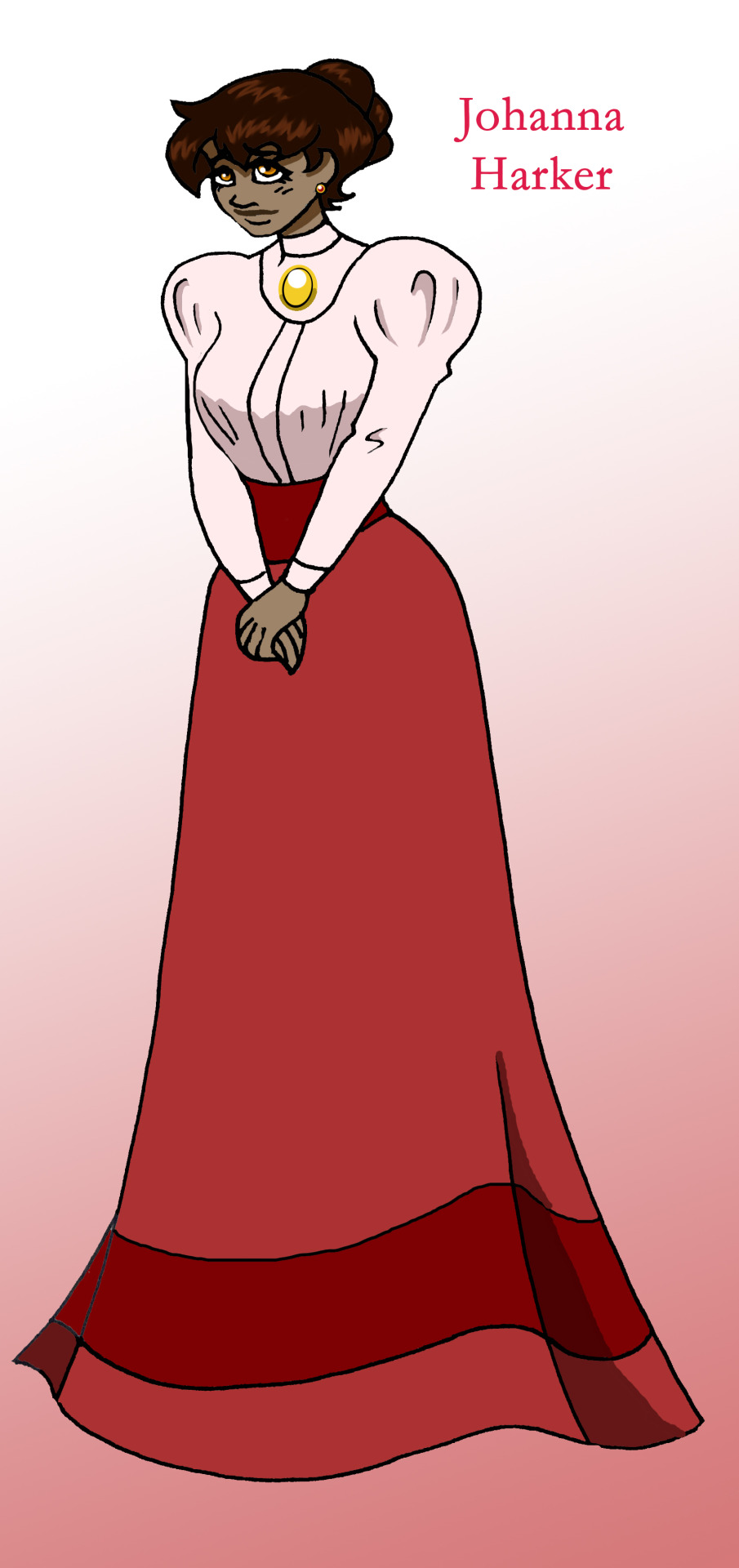
First thing's first--she almost definitely gets shouldered out of the Important Solicitor's position due to reasons of Being Girl. But she still has to get to Transylvania to be menaced by Count Bat Bastard. How?
Hawkins! Johanna is working at the firm as a secretary and personal assistant to a still very paternally mushy old Peter Hawkins. When Dracula's request comes around, he can't give up such a lucrative client over his gout and there's no one he trusts to pass it to. He has to go. And it'd only be right to treat his surrogate daughter to a paid scenic vacation have his aide along on the business trip. Especially when she hunted down Carfax Abbey herself! What a lovely outing they'll have.
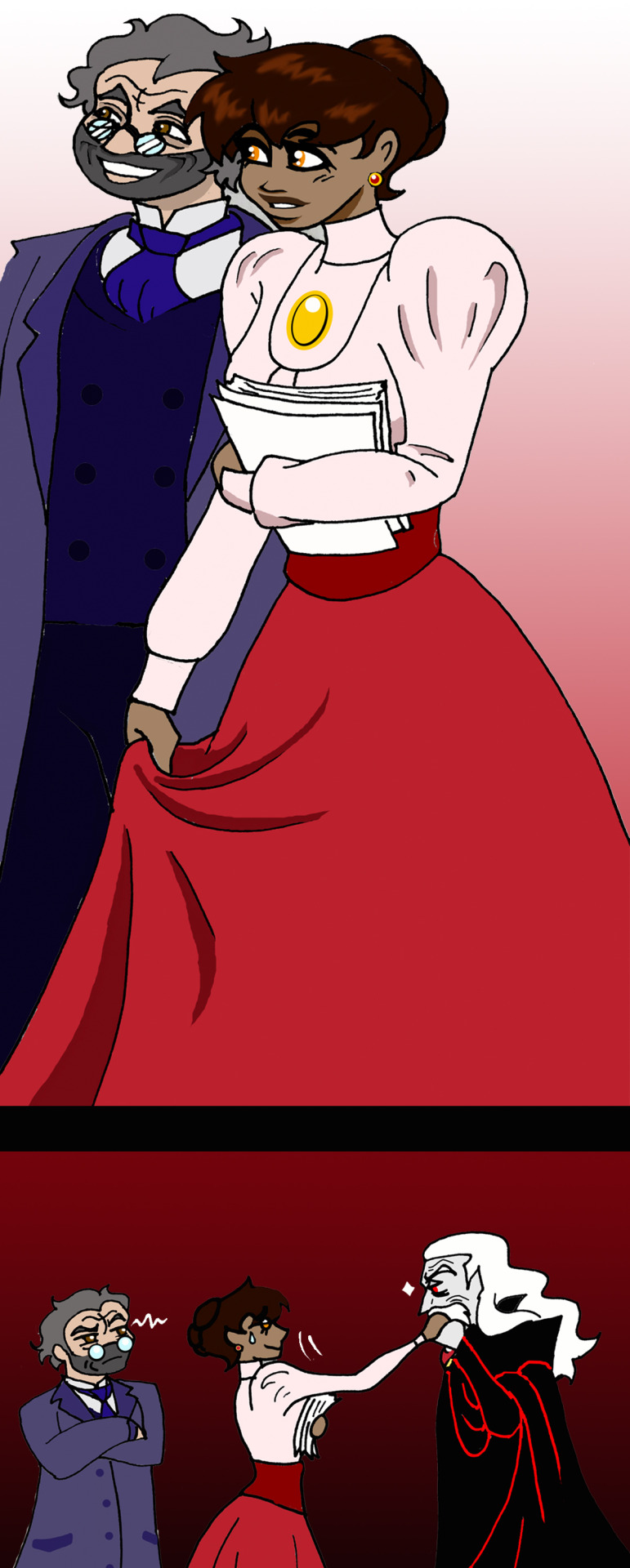
...or not.
True to form, Count Dracula is very much not to be trusted around pretty young things of any kind. Considering his canon habits, things aren't about to go any easier for Miss Harker. But at least she has Hawkins watching out for her in-person! It all makes for some very tense talk when discussing anything other than the estate purchase; which Hawkins seems as keen to rush as Dracula is to dawdle over. But at least they'll be out of here soon. What's a couple of awkward nights, right?
One in particular has Johanna nervous as she goes to bed. Hawkins had taken Dracula aside with a hard smile, insisting there was a 'delicate matter' he wished to speak with the Count about. The last time a 'delicate matter' was brought up was when he nearly lobbed a typewriter at one of his ex-solicitor's heads for some distinctly unseemly behavior in her direction. She hopes there isn't a storm brewing under their host's roof. She hopes harder that tomorrow they'll be heading back to the Borgo Pass.
Instead:
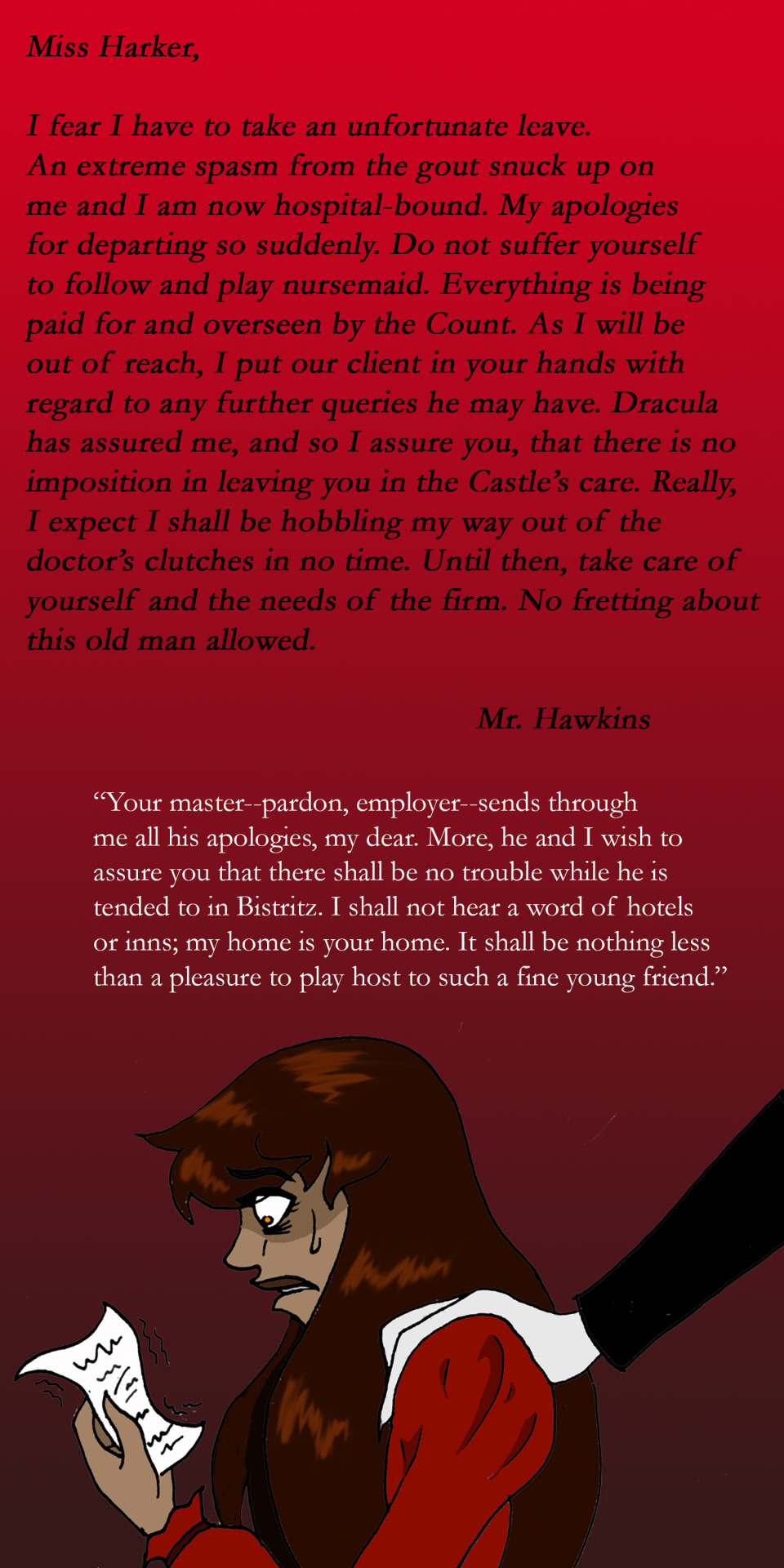
Oh.
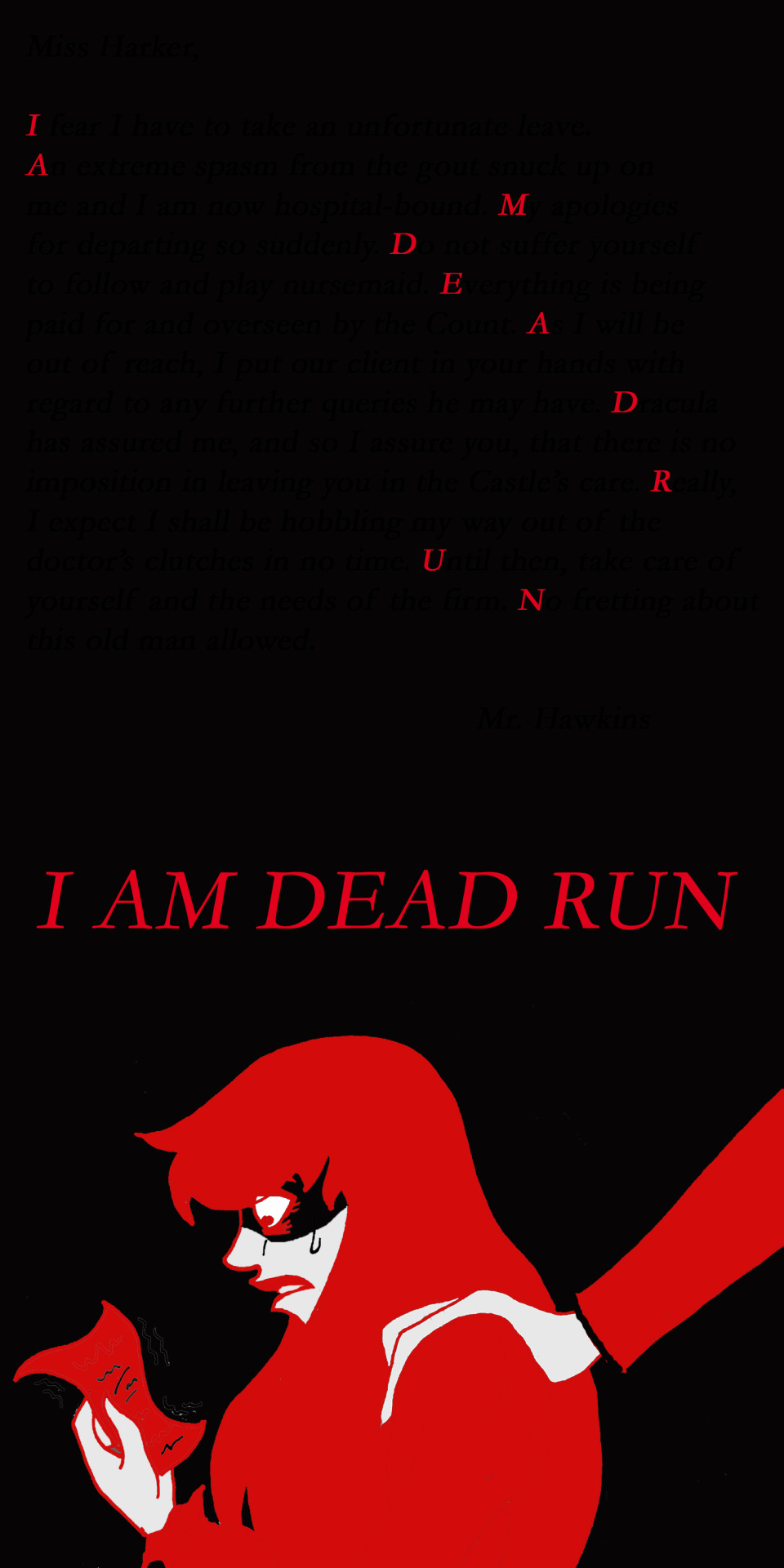
Oh no.
Between this and one requisite nightmare-week in which the joys of womanhood come and go--let's leave it unspoken whether her set of bloodstained cloths stay in her possession or not--Johanna gets put through the wringer. Per usual. But eventually..!
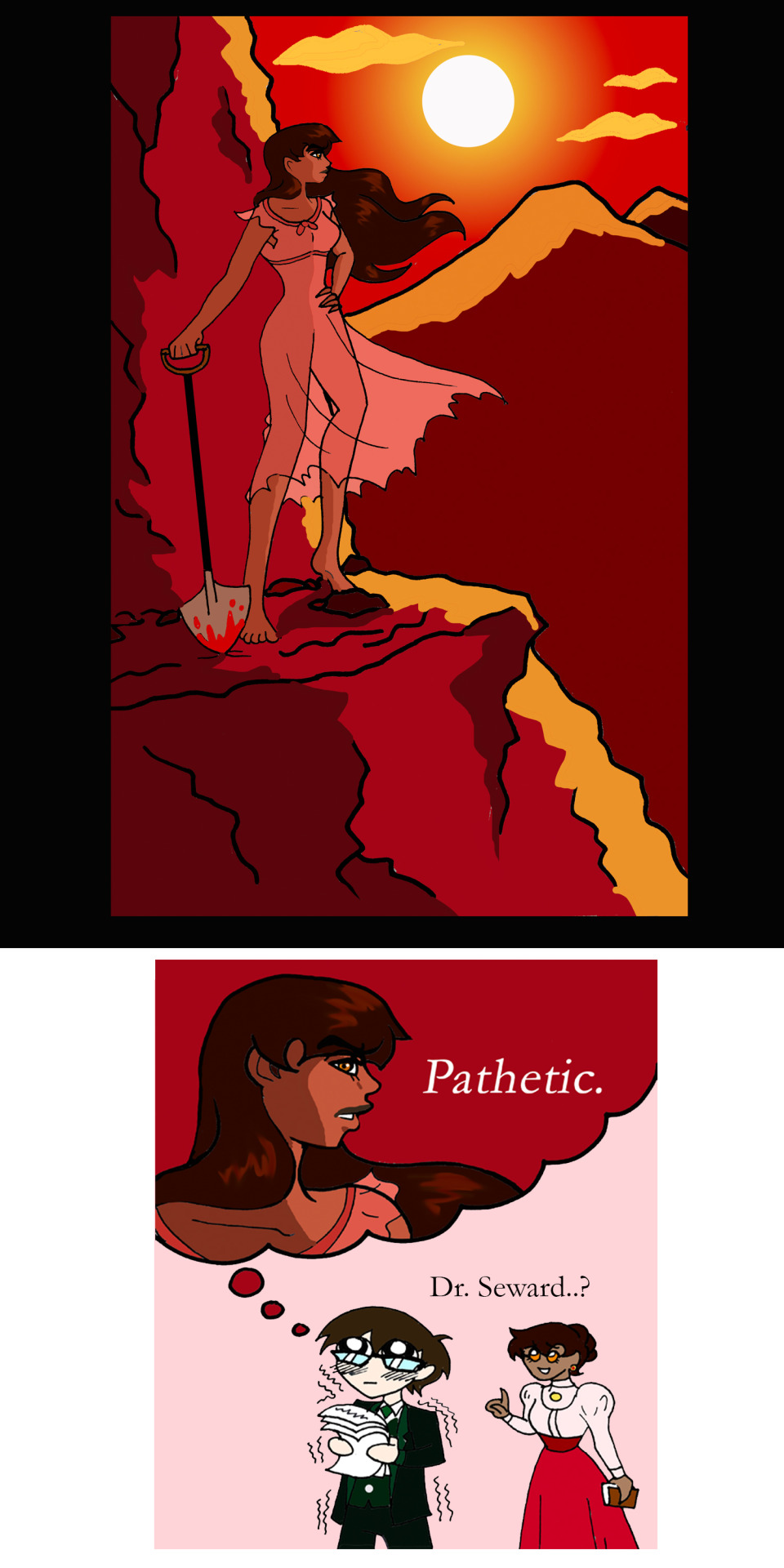
Yeah. No shock there. Deep calming breaths, Jack. Don't let the wonderful diary concuss you.
Part of being one of two (gasp) G I R L S in the Scooby Gang, Van Helsing and company vote Johanna and Mina out of the dirt hunt. Except. Well. Johanna is still necessary to have on the ground here. She's the only one with the location intel--and a surprise willed gift of inheritance and the firm from poor Hawkins, who the Transylvanian locals all vouch for as being 'slain by wolves,' leaving Johanna free of blame--so she's still running around for the crew.
Even so, odds are high that she initially gets sidelined with Mina. Which isn't overly awful. It is good to be side-by-side in this timeline! No needless sequestering from each other! Johanna is already planning to see Mina back to their new house before they have to sleep another night in an asylum.
And then comes the 3rd of October.
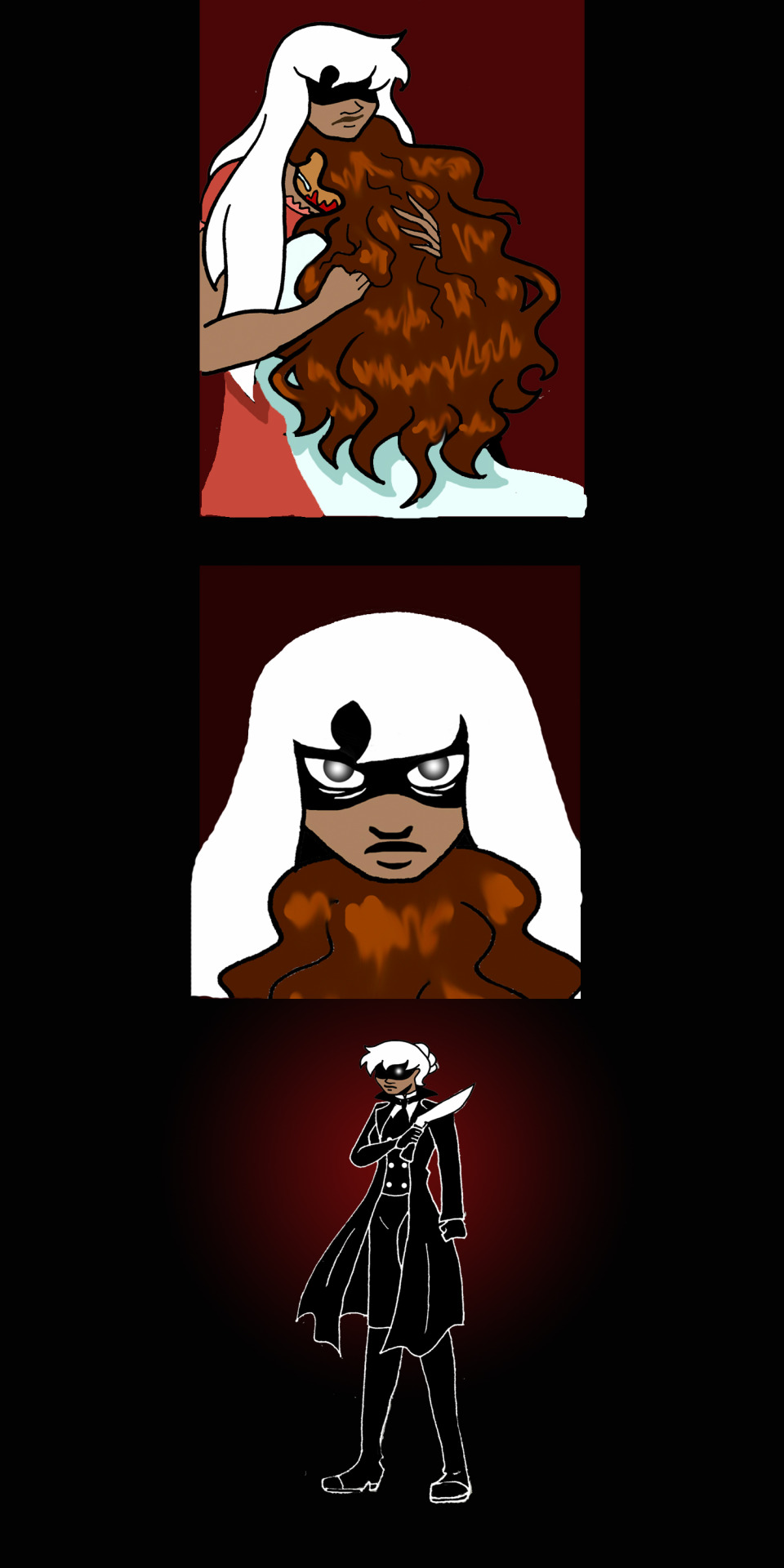
Van Helsing: "Madam Harker, is it not somewhat attention-catching to wear trousers in public? We are meant to be unremarkable while we wait on th--"
Johanna, has already smoked through two cigars, kukri in her lap, playing a game of chicken with God: "Do you think I scaled a mountain in three layers of skirts, Professor? No? Then I will not do the same if the rancid bastard tries to escape out the window."
Van Helsing, aside: "Friend John, can you speak sense to her?"
Jack, melting off the side of the bench: "I think I hauve consumption"
Anyway. She very much does get to the Dracula head chopping. And there will be much rejoicing. BUT all that grimdarkness aside, there are other, more hijinks-flavored opportunities to think of with this particular set up. If only because I genuinely believe that Lucy and Art, having two spare best friends on hand and a general vibe that radiates 'ooooh what if triple wedding???', would come up with the following master plan. Some truly Shakespearean folly kind of shit:
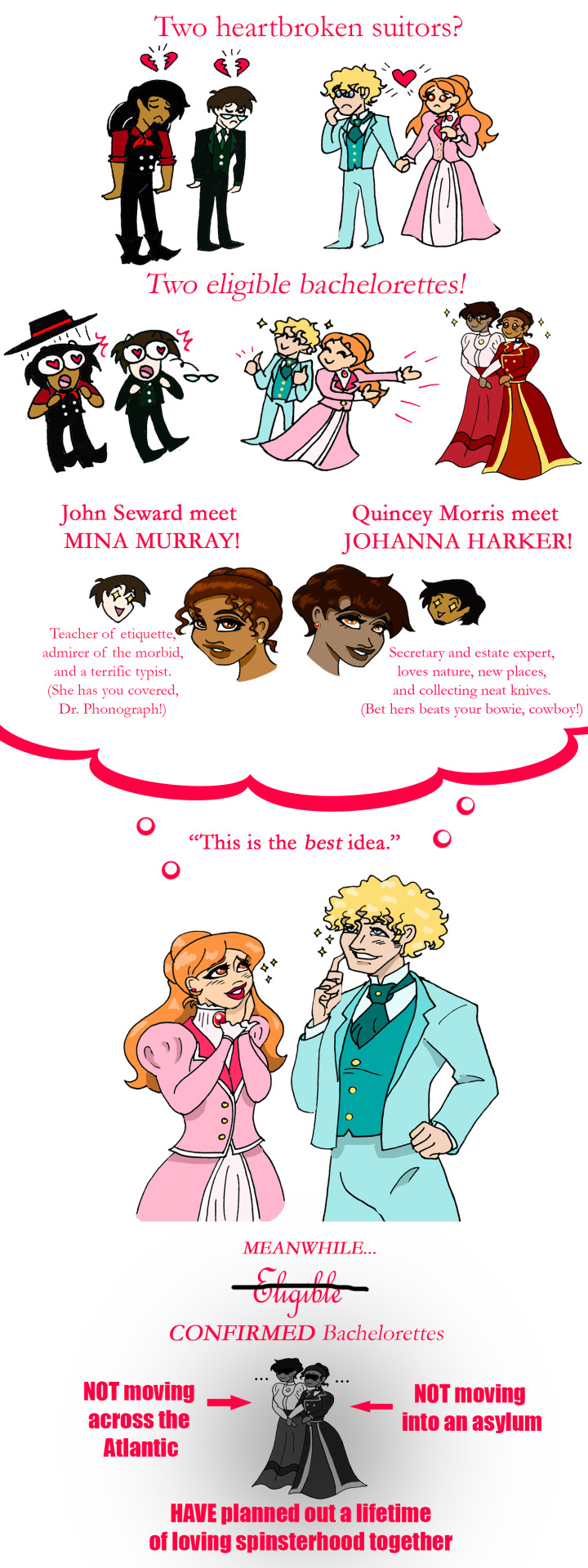
Thankfully, Johanna and Mina nix the idea pretty quick. Case in point:

And, last but not least, my final word on the range of Jonders that exist within my very best gothic heroine friend:
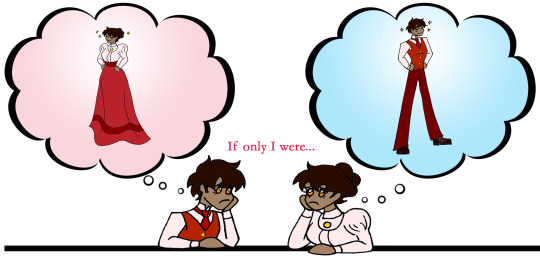
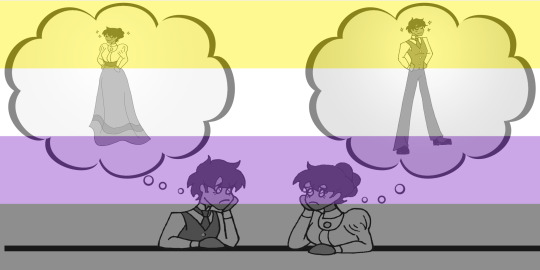
ha ha I do that
#here take this giant monstrosity I cannot look at it anymore#my hands are rebelling and my eyes are fleeing to avoid looking at the screen#augh#jonathan harker#johanna harker#mina harker#mina murray#lucy westenra#peter hawkins#jack seward#abraham van helsing#arthur holmwood#quincey morris#dracula#my art#my writing#dracula spoilers#kind of
488 notes
·
View notes
Note
"Even during daylight, Thomas fails to destroy his tormentor. In the story sense, he cannot do it because Orlok is a vampire; on the symbolic level, we understand that he cannot kill his own nature."
So, unrelated, but because I see the Harkers, too, as queer (though bisexual, I cannot not read them as unfathomably horny for each other, and genderqueer) and the biting and blood drinking as metaphors in Dracula too... I wonder if the above also applies to Jonathan Harker when he struck/marked but failed to kill his tormentor? Though he does succeed at the sunset in the end...
Yes omg I agree with you 100%! To give the Hutters credit where it's due, I think the film makes it fairly obvious that Ellen is bisexual as well; but I personally cannot help but see Thomas as a closeted gay man. He tends to shy away from his own wife throughout the film - the only scene where he does not is after she's baited him into trying to reassert his masculinity, and even that fizzles. He definitely cares for her, of course; but I don't think he's really attracted to her, is the thing.
The Harkers couldn't be more different. In fact, one of my favourite aspects of their story is the way they're both utterly obsessed with each other - which absolutely does include being unfathomably horny, exaaactly. That said, they're both distinctly queer - Jonathan's coding being more prominent - and I actually have posted a slightly more detailed analysis about it here. The scene of Thomas' attempted destruction of Orlok is indeed directly inspired by Jonathan's attempt at killing Dracula - and, as you say, he did eventually succeed; but I think that only really elaborates on his overall arc.
While Jonathan, unlike Thomas, is able to go from being a classic damsel in distress to assuming the role of a fighter, there is another, far more curious development in his characterization. As the story goes on, his hair turns grey, it is mentioned that his hands are very cold, his love for Mina takes on a practically violent intensity (though the violence is directed outwards, never at her); and, by the finale, despite having started out as a mild-mannered English solicitor, he is somehow able to expertly wield a kukri knife. The description is unmistakable; by the time Jonathan faces Dracula on the field of battle, they are each looking into a terrible mirror - each personifying what the other could have been. Assuming the usual vampiric parallel to queerness, it may be said that this is indeed his Turning; or as close to it as he would get without getting actually vamped.
I think Jonathan is able to accept himself by the end. By assuming the shape of Dracula, and by killing the one that terrified him originally, he kills his fear and becomes Himself.
#nosferatu#dracula#jonathan harker#mina harker#jonmina#it's like that story: kill a dragon -> become a dragon#'dracula' actually translates to 'son of the dragon' which is rather apt i think#seriously look him up like actually. the guy's like a fucking game of thrones character. a targaryen of some sort#that said: men will say they're fighting their demons and the demons are bisexuality#bram stoker#dracula x jonathan harker
64 notes
·
View notes
Text
On a more serious note, the word to describe the liminal faux-pas, and the actual ticking clock situation with Mina's onset tranformation in this entry is: Obliviousness.
Whenever Stoker had intended for this entry to be read like this or not, it's incredible how it encapsulated the sheer oblivious confidence of Jack, and Van regarding their so called subtle ways of checking if Mina is a vampire. It's an oblivious feeling, AND that comes from their own reassurance as intellectuals within the dynamics of the group.
"We talk of her often; we have not, however, said a word to the others. It would break poor Harker’s heart—certainly his nerve—if he knew that we had even a suspicion on the subject."
While forgetting who was the person who provided all of the information that both of them are using in the first place.
It seems that Jack has forgotten that out of everyone currently living in that room, Jonathan is the only one with both theorical and practical experience with vampires. He endured hell for two months in that castle while interacting with them on a daily basis.
Jonathan knows what Jack knows, and certainly knows it on a much personal scale than Van Helsing and Seward. He knows the exact pretend game they are playing every time Mina needs to be hypnotized, which is why now he refuses to leave her side, and puts more resistance in their interactions.
"Van Helsing examines, he tells me, her teeth very carefully... for he says that so long as they do not begin to sharpen there is no active danger of a change in her. If this change should come, it would be necessary to take steps!... "Euthanasia" is an excellent and a comforting word! I am grateful to whoever invented it.
It's incredible how sure they are that neither Mina nor Jonathan have noticed anything regarding their constant checking. Nevermind how Seward notes how Jonathan has become more wary of them, and now carries the kukri knife everywhere he goes like a self defense weapon.
Both Seward, and Van Helsing are so self assured in their handling within their intellectual way of thinking to the point of documenting such theories for everyone to read that they are oblivious of the very much present Jonathan keeping tabs on them for Mina's safety.
#Jack and Van Helsing you are not as subtle as you think you are#These two are also going to give Quincey stomach ulcers because how they are acting around both Mina and Jonathan#dracula daily#dracula#jack seward#abraham van helsing#mina harker#mina murray#jonathan harker
454 notes
·
View notes
Text
One of the things I'm taking away from the second go round of Dracula Daily (and particularly from David Ault's excellent performance in Re: Dracula) is how much I like Lord Arthur Godalming.
Like. On the surface and the first time round he stands out the least of Lucy's suitors, and given how much time we hear from Jack, he can come off the most developed. Quincy, of course, gives us a heck of a lot of personality with relatively little (again, compared to how much we get from Jack). Arthur, though, doesn't have the same volume of words to develop, nor the instantly clear personality. He's just Lucy's fiancee, Jack and Quincy's friend, the heroes of light's wealthy benefactor.
But God, this poor man. He's suffered several immense losses in a very short period, been forced to see the woman he loved as a monster, and then had to put her down so she could rest in peace. Beyond the emotional burdens of such losses, he has to deal with the legal matters and the settling of affairs for three different people, probably doing whatever one needs to do to take his father's place in the House of Lords (something I know absolutely nothing about but I assume there's things to do there), AND the earth shattering revelation the supernatural is real, monsters do exist, and the one who killed Lucy is still out there.
And all of that while having to abide by the Victorian standards of manhood. Stalwart, strong, showing no emotions that could make him seem weak.
I think the scene in September 30th, where Mina comforts him and finally he has the chance to let go of all of these burdens he's felt he must carry alone, all of the grief and sorrow he's been forced to carry, he can for at least a moment put aside the mask of manliness society insist he wear and just let himself be a man who has lost his father and his fiancee within days of each other, who is dealing with situations beyond belief.
Obviously we've seen him cry and grieve before but it always felt like he was stifling it to a degree because, well. He only has his male friends to lean on now and the stupid proprieties of society mean he can only lean so much. But now he's had a chance to finally let go, made a connection with Lucy's dearest friend and a new sister of choice. He has his friends, he's finally been allowed to mourn in the way he's truly feeling...and now he's ready to help in whatever way possible to avenge Lucy.
Arthur comes off to me as a very strong character, a man driven by great love, who's emotions, as constrained as they may be, are one of his greatest strengths (and, of course, every good monster hunting group needs a financial benefactor). He's not a flat character at all, he's not forgettable character. Lucy loved him for a reason and, I think, in the moment his grief finally breaks, we get a glimpse at that.
I think that one of the good things of Dracula Daily has been making people realize how good of a character Jonathan Harker is, how pop culture has done damage to the true character of Lucy and Mina…I think we should add that its done a good job of making one care for a character as Arthur, who at first glance seems flat and boring.
Or at least it's made me appreciate him more. And I still want to know how he and Jack and Quincy became friends and what sort of shenanigans they got up to before the events of the book.
#dracula#dracula daily#dracula daily 2: vampire boogaloo#dracula spoilers#dracula daily spoilers#arthur godalming#re: dracula#seriously David Ault has done such a good job with him
583 notes
·
View notes
Note
Dracula like, this kid's been in a coach of terror all day and I kept driving him into circles and he kept drifting off and he was scared out if his mind and he waited an hour outside the door in the cold. I'll have chicken with sides prepared next to the hearth and he'll be putty in my hands.
And the worst part is that he's right.
Jonathan graciously accepts the Count's hospitality. It is reassuring to him, and he feels his worries melt away as he slowly winds down from the hectic journey he just weathered.
The light and warmth and the Count's courteous welcome seemed to have dissipated all my doubts and fears.
But... if there is any reassurance to derive from this... putty is only so easily moldable when you play with warm hands.
...he moved impulsively forward, and holding out his hand grasped mine with a strength which made me wince, an effect which was not lessened by the fact that it seemed as cold as ice—more like the hand of a dead than a living man.
Jonathan is willing to power through his weariness, but he's not blind to the fact there is something very wrong with the Count. He's just unwilling to broach the subject, he hopes he shall not have to, that he'll get his work done and go home to Mina, making his stressful business trip seem like nothing more than a bizarre dream. In the meantime, he will take comfort in the Count's odd geniality.
But JESUS I SHOULD REALLY TALK ABOUT THE COUNT! SORRY!
Dracula relishes in this. The shame of being a boyar with no staff or subjects and having to do all the work himself is outweighed by the thrill of pulling the wool over an innocent lamb's eyes and leading him to slaughter. Even as Jonathan notices all the little things wrong (we were simply going over and over the same ground again–– for a moment I doubted if it were not the same person to whom I was speaking––his breath was rank––), he cannot voice any of his concerns, and Dracula takes full advantage of this. From the very start, he is gloating:
"Ah, sir, you dwellers in the city cannot enter into the feelings of the hunter."
This is the Count's hunt.
I decided to wait till today to answer because May 7 provides more of Dracula's perspective. He's been planning this trip to England for a while, as evidenced by his numerous books and just how perfectly he speaks English. But he's unsatisfied with his speech. He knows it makes him unfamiliar, a stranger. When he travels to London, he wants to blend in as one of the sheep, such is his excuse for requiring his solicitor to come to him. He intends to use Jonathan as a study for what to expect of the faraway land he longs to conquer. And, in the meantime, he shall also teach Jonathan the ways of his land.
When I go there I shall be all alone, and my friend Harker Jonathan—nay, pardon me, I fall into my country's habit of putting your patronymic first—my friend Jonathan Harker will not be by my side to correct and aid me.
This "mistake" appears very intentional. By addressing Jonathan according to his country's rules, he, however passively, asserts his superiority over him. Think when someone gets your name wrong on purpose, it's a tactic used to deny you ownership of yourself. I'm not prescribing this intent to anyone who makes a mistake like this, but Dracula speaks in such a measured way that I doubt he truly slipped up. It's so small of an inconvenience in this case that Jonathan voices no thoughts on the matter. But Dracula is priming him for his stay in Castle Dracula. As Jonathan teaches him the way of the Englishman, Dracula shall teach him the way of the Transylvanian peasant. Quite literally when he speaks of the blue flames.
"Why, even the peasant that you tell me of who marked the place of the flame would not know where to look in daylight even for his own work. Even you would not, I dare be sworn, be able to find these places again?" "There you are right," I said. "I know no more than the dead where even to look for them."
Such an obvious HINT! It's another "for the dead travel fast". Jonathan acknowledges "only the dead would know where to look", and Dracula just goes "...anyway--"
Dracula does not hesitate to drop hints about his nature. Oh, he cannot live in a new house? He would die in a new house? He travels to England in search of newer, broader horizons, but he does not wish to stand out. He intends to insert himself into the history of London, becoming one of England's many ghosts, once more a master but of a different people who don't know the danger he poses. Right now, Jonathan can find nothing wrong with this–
I felt that it was getting very late indeed, but I did not say anything, for I felt under obligation to meet my host's wishes in every way.
–and again, he is bound by the Count's good graces. Dread creeps in his mind and he thinks of death as morning sneaks up on him.
They say that people who are near death die generally at the change to the dawn or at the turn of the tide; any one who has when tired, and tied as it were to his post, experienced this change in the atmosphere can well believe it.
Dracula keeps him awake through sunset and sunrise, forcing him to experience the change in atmosphere and foreshadowing his plans for him. He's playing with his food in a way Jonathan doesn't consciously but subconsciously recognizes.
710 notes
·
View notes
Text
Last night I saw the silent Nosferatu (1922) set to Radiohead in a basement theater. It was amazing. 10/10. I can absolutely see why the Stoker estate sued—it was honestly one of the best Dracula adaptations I’ve ever seen—but I’m so happy it survived. This is your long post warning. There will be spoilers for Nosferatu ahead! That being said…
Similarities between the 1897 novel Dracula and Nosferatu (1922):
A real estate agent (named Hutter, not Harker) goes to Transylvania to sell a mysterious count (Count Orlok) a house.
In Transylvania, Hutter is warned by locals about the evil that lurks in the castle—and completely ignores it.
He has a scary carriage ride to the castle driven by a man who is Definitely Not The Count (/s).
He leaves his beloved, (Ellen, not Mina) behind.
He discovers the count’s true nature after finding him asleep in a coffin during the day.
He escapes the castle and is ill in a hospital with a fever.
Count Orlok travels from Transylvania to Germany (more on that later) via ship. He eats everyone on the ship.
There is a person in an insane asylum (Knock, not Renfield) who calls the Count “master” and seems to have a connection with him.
Differences between the 1897 novel Dracula and Nosferatu (1922):
The movie takes place in 1830s Germany in a town called Wisborg while the novel takes place in 1890s London, England.
Count Orlok is a devil? Unsure.
Hutter gets to the castle primarily on foot or horseback, rather than by train.
Hutter and Ellen are already married at the start of the movie.
The first time we see Count Orlok thirst for blood is when Hutter accidentally cuts his thumb while slicing bread for dinner, rather than when he cuts himself shaving.
When he discovers Count Orlok asleep in a coffin, he does not try to decapitate him with a shovel :(
There are no vampire women that seduce/attack Hutter.
Ellen does not go to see Hutter when he’s in the Transylvanian hospital, he makes it home on his own.
The character of Lucy Westenra does not have an analog; Ellen takes on her sleepwalking.
Because Lucy does not exist, neither does the Suitor Squad :(. Van Helsing does have an analog in Professor Bulwer and Jack Seward has an analog in the asylum doctor, but they’re both very small parts.
There is a greater emphasis on plague and disease than there is in the novel, as the rats from Count Orlok’s ship bring the plague to town (a convenient cover for his murders).
Count Orlok doesn’t turn his victims into vampires—he just kills them.
Count Orlok dies via exposure to sunlight but in the book sunlight does not kill Dracula, it only weakens him.
Ellen dies after Count Orlok feeds on her.
The characters do not go back to Transylvania. Once Count Orlok goes to Germany, the events of the movie stay there.
#nosferatu 1922#nosferatu#dracula 1897#re dracula#dracula#vampires#gothic horror#vampirism#gothic#vampire posting#horror movies#she speaks
35 notes
·
View notes
Text
it actually really annoys me how well death note fits into dracula because i don’t like writing l/light as a predatory dynamic even though i do enjoy reading fics with that interpretation sometimes but like the correspondence is so so clear. dracula (L) and his three roommates (near mello matt). mina “haha i bet those newfangled feminists will be the one doing the proposing not like me i am polite and normal” “holds her husband’s arm instead of the traditional other way around” harker is obviously kiyomi takada since they are both the repressed butches of all time and id really like to see kiyomi have a breakdown about holy items leaving scars in her skin. i actually cannot decide between jonathan-light and lucy-misa or the other way around because lucy “i fancy myself a tough nut to crack” “my entire personality is masks and i die by suffocation under them” westenra could fit both of them so well but jonathan’s manic devotion is honestly very misacore. renfield mikami is very important to me not just because disciple god etc but because renfield tries so hard to get everyone else to take him seriously by acting the part of the refined gentleman he once was and because his last act is a futile attempt at resisting his god (and as a bonus he gets along with mina-kiyomi). the suitors are also there i guess
#sorry i like the suitors im just not as insane about them#anyway hello mutuals who Do like them as a predatory dynamic. have you considered#ugh both jon misa and lucy misa are so good this is the problem#misa as a party girl who after undeath turns shy and meek and the exact housewife she could never quite become#and doesnt suck in a breath when kiyomi brushes her thumb over misas carotid anymore. just gazes at her with flat blue eyes#but also misa as jonathan harker. holiest love. if my boyfriend is going to hell then im going with him and damn the rest of you#(but that only works if mina is light)#death note#actually if we’re only considering characterization i think the most accurate casting is seward light and van helsing L lmao#and also theres a really good alternative with mina-mello jon-near lucy-matt. because if we’re doing catholic guilt mello we might as well-#-go all in!#and of course near “yes mello killed half my team but have you considered i love him” river would be jon.#but anyway#from the drafts
14 notes
·
View notes
Note
Sure! What styles do you see Edwardian Mina prefer?
I was going to say that I don't know enough about fashion history to have thoughts on this, but it turns out I have loads of thoughts anyway.
Up until Mr Hawkins' death, Mina's dress sense would have been relatively constrained. Victorian clothing was expensive. A particular difficulty for teachers in the kind of school where Mina (presumably) worked is that they had to project the lifestyle of the upper-middle and upper-class students that they catered to, but on salaries that made that kind of lifestyle a stretch to afford. Clothing would have been a significant part of that. I think it's plausible to say that Mina would have dressed in whatever she could afford that projected the right image for work, and there wouldn't have been room in her budget to reflect her own tastes all that much.
All that would change, of course, when Mr Hawkins died, Jonathan inherited and suddenly the Harkers are rich. I imagine that would feel quite daunting at first. Probably a little upsetting too, because if Mina was going to ask one person to advise her on how to dress now she can afford to do it stylishly, that person would be Lucy, and Lucy is gone. (I know that Lucy says she doesn't take enough interest in dress to describe the new fashions, but the fact that she brings that up out of nowhere in the middle of an unrelated letter makes me think that however boring she finds fashion, she probably had it foisted on her. And she would, had she lived, have loved to help Mina spend her newfound money on buying lovely things).
But I think by the time the Edwardian period came around, Mina would be able to fully enjoy dressing well. I didn't know much about Edwardian fashion but I was browsing the V&A online collection and found their collection of clothing that used to belong to a socialite called Heather Firbank. She was about 10-15 years younger than Mina would have been, but her clothes feel very Mina-ish to me.
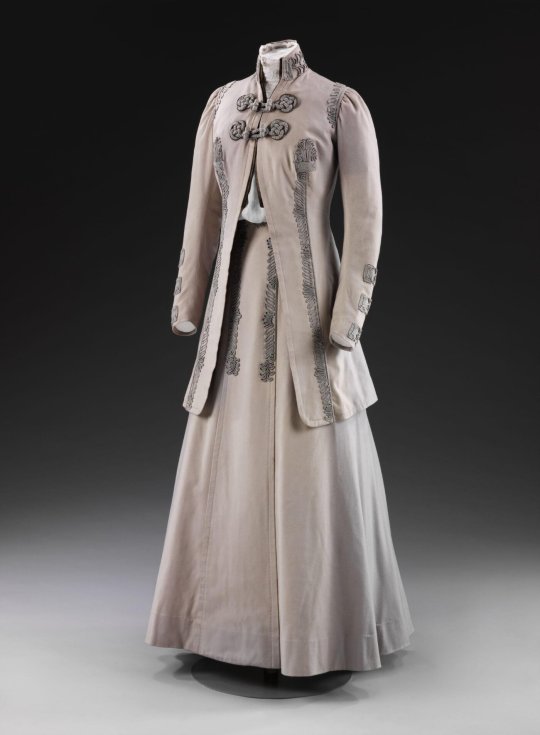
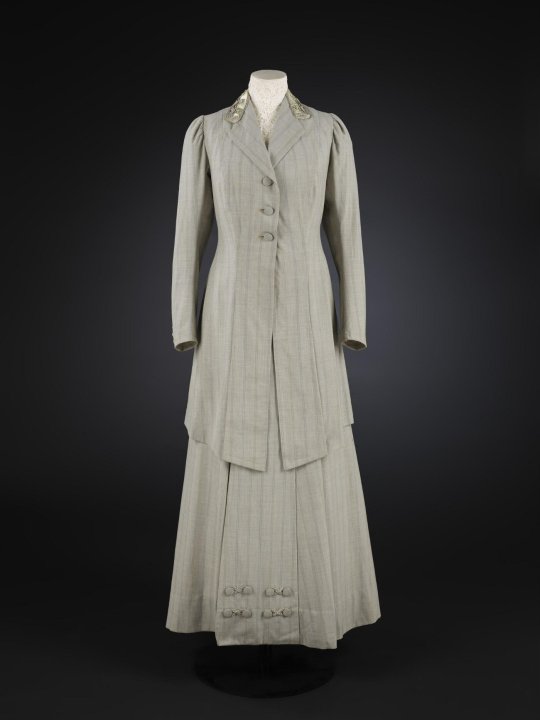
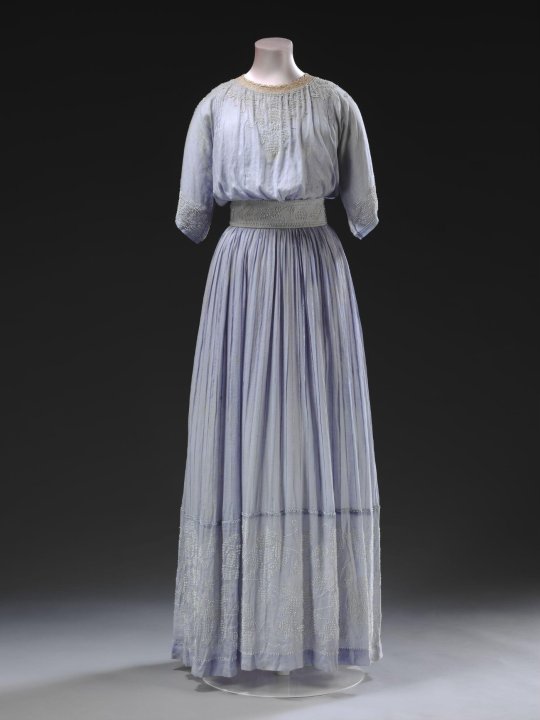

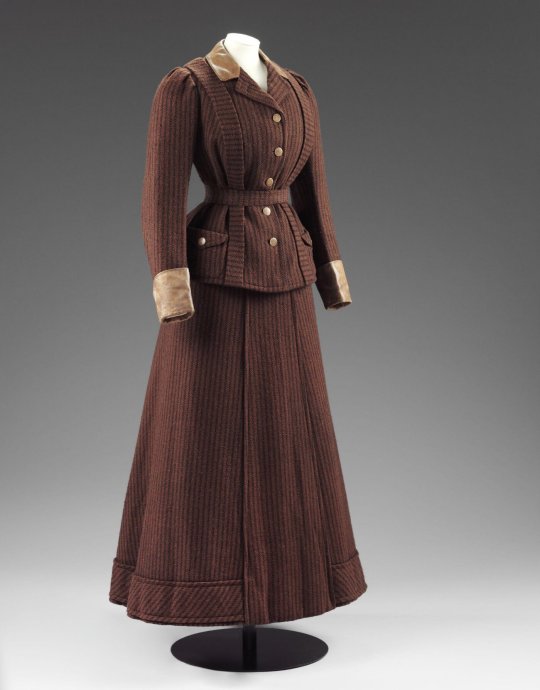

Like, it's not just me, right? These are Mina clothes?
I particularly like the symbolism of Mina moving from dark, heavy Victorian clothing in the 1890s, to leaving that troubled period behind and wearing things that are lighter, more comfortable and easier to wear.
87 notes
·
View notes
Text
Thinking about 4.05 "Monster Movie" and how the shifter (Lucy) who dresses up as Dracula fixates on Jamie and Dean, casting Jamie as Mina and Dean as Jonathan Harker—Mina's fiance—the righteous hero who, with Van Helsing, saves Mina from Dracula.
The last time we really focused on the POV of a shifter was 1.06, where our shifter was a Dean parallel. This time I think our shifter represents Sam—or rather, the shifter represents Sam’s feelings about his own monsterhood, and the occasional envy he feels toward Dean—Dean who is cast by the envious shifter as righteous hero who "gets the girl" (but not this time, Harker!) In season 4, Dean will be given the title “The righteous man”. The same angels calling him that will call Sam “The boy with the demon blood” and “abomination”.
Opening on the scene where Dean has been dressed in lederhosen and tied up by the shifter:
DEAN looks at a portrait of a woman’s face on the wall which resembles LUCY. DRACULA She is beautiful, no? Bride number three from the first film. She never got the acclaim that she deserved. Which is why I chose her shape, her form, to move among the mortals unnoticed. To listen to the cricket songs of the living. That is when I discovered my bride had been reborn in this century.
The shifter wanted to fit in—to be perceived as normal—so they chose Lucy’s shape. It isn't difficult to connect that desire for normality with Sam's initial desire for normality. But the shifter discovered Mina (Jamie) and then everything changed.
In “Monster Movie”, the shifter initially despaired of their monsterhood, but monster movies gave the shifter a sense of dignity—a taste of power.
DRACULA "Real" is being born this way. Different. "Real" is having your dad call you "monster" -- it's the first time you hear the word. And he tries to beat you to death with a shovel. Everywhere I ran, everywhere I tried to hide, people found me, dragged me out, attacked me. Called me "freak," called me "monster." Then I found them. The great monsters. In their movies, they were strong. They were feared. They were beautiful. And now I am like them. Commanding. Terrifying.
I'm immediately reminded of a speech Sam gives in the previous episode, explaining why he's decided to embrace demonic power (4.04):
SAM I've got demon blood in me, Dean! This disease pumping through my veins, and I can't ever rip it out or scrub it clean! I'm a whole new level of freak! And I'm just trying to take this - this curse... and make something good out of it. Because I have to.
In Dracula, Mina was saved from Dracula at the end of the story by Harker and Van Helsing. Lucy wasn't able to be saved—she was a victim of Dracula’s, who started out a kind, soft hearted woman, but was killed by Dracula and reborn as a monster who fed on children. She was subsequently destroyed by Van Helsing.
In our parallel, I don't think Mina (played by Jamie) parallels a person so much as Mina represents an ideal or desire. Mina represents "getting to be the hero"—Mina represents the capacity for redemption.
What the shifter (and Sam) don't know is that redemption is something Dean is also seeking:
JAMIE That must suck. I mean, you're giving up your life for this terrible... I don't know, responsibility. DEAN Last few years, I started thinking that way, and, uh, it started sort of weighing on me. Of course, that was before... A little while ago, I had this – let’s call it a near-death experience. Very near. JAMIE sits down next to DEAN. DEAN And, uh, when I came to... things were different. My life's been different. I realize that I help people. Not just help them, though. I save them. I guess it's -- it's awesome. It's kind of like a gift... like a mission. Kind of like a... a mission from God.
Dean is on a mission from God—and we as forward-looking viewers who know Dean tortured souls in hell have a better understanding of why Dean ties himself to that mission—as a form of redemption.
Monsters on the other hand... monsters don't get the girl—monsters don't get redemption—monsters don't save the day. Harker and Van Helsing save the day, and Harker (Dean) gets the girl.
DEAN You do realize what happens at the end of every monster movie? DRACULA Ah, but this movie is mine. And in it, the monster wins. The monster gets the girl. And the hero, he’s... electrocuted. And tonight, Jonathan Harker, you will be my hero.
This is, in some sense, our Sam from 4.04 manifesting a win—manifesting becoming the hero through monstrosity. Dean doesn't get to be the hero this time.
SAM Dean, I need her to help me kill Lilith. I know you can't wrap your head around it, but maybe one day you'll understand. I'm the only one who can do this, Dean. DEAN turns back around. DEAN No, you're not the one who's gonna do this. SAM Right, that's right, I forgot. The angels think it's you. DEAN You don't think I can? SAM No. You can't. You're not strong enough. DEAN And who the hell are you? SAM I'm being practical here. I'm doing what needs to be done.
Sam wants Dean to take a back seat. In a sea of motivations for lying and working with Ruby, one of them—most certainly—is that Sam wants to be the hero and wants Dean to not be the hero... and in some sense, this also fits with shifter who tries to force Dean into a role—who insists Dean play the role of Harker... who, while one of the story's heroes, also plays the part of the damsel in distress at various points in Bram Stoker's Dracula.
Crucially though, Sam isn't just represented by Lucy and the shifter in "Monster Movie". Sam is also associated with Van Helsing—or rather—when Sam arrives to free Dean and Jamie, the shifter shouts,
DRACULA You will never be Van Helsing!
This is Sam's despair in the mouth of the shifter. Sam could never be a traditional hero. He's unclean—he could never be a hero like the badass Van Helsing—the closest thing the Dracula novel has to a hunter (knowledgeable, strong, tenacious, clever). Sam could never go on a quest like that.
SAM Knights of the Round Table. Had all of King Arthur's knights, and they were all on the quest for the Holy Grail. And I remember looking at this picture of Sir Galahad, and, and, and he was kneeling, and— and light streaming over his face, and— I remember... thinking, uh, I could never go on a quest like that. Because I'm not clean. I mean, I w— I was just a little kid. You think... maybe I knew? I mean, deep down, that— I had... demon blood in me, and about the evil of it, and that I'm— wasn't pure?
The thing is, Sam is paralleled with the shifter as Lucy (desperation for normality) and as Dracula (despair, reclaiming monstrosity as his own), but Van Helsing is also a part of Sam too. Van Helsing represents Sam's ability to choose his destiny—Sam's ability to choose to be a hero, despite how he's despaired of ever being clean. He just has to realize it's his choice—that life is not a maze he has no choice but to run through. He is not unclean. His destiny is not defined by Azazel's blood.
JAMIE Ever think that maybe you're lonely because you kill people? DRACULA Or I kill people because I’m lonely.
Sam continues through season 4 with this same frame of mind in a sense—not in the sense that he's killing people (though... at one point, he will) but in the sense that his actions are someone else's fault and are out of his control. And yet, the capacity to be Van Helsing and not the monster who despairs remains.
61 notes
·
View notes
Text
As a follow-up to my post on how I feel about Mina having a child at the end of the story, I just want to point out that Victorians treated pregnancy very differently.
There was a real discomfort about seeing pregnant people in public, because it was a reminder that they had sex! In the Victorian era women generally tried to live normally as much as possible until they began showing their baby bump. After that, they were meant to stay at home until after birth. This is why they didn't really have maternity clothes, despite Victorian etiquette indicating that you needed a special outfit for EVERYTHING. It was a generally taboo subject in public.
So to me, the Harkers waiting a few years before having children makes sense because it allows Mina room to have a normal life for a bit. We see how active she is, taking trains by herself, arranging meetings, going for walks, etc. And in addition she wants to support Jonathan in his office as a secretary. For her, pregnancy would be a huge lifestyle change and they would have to plan for it, especially since they are both orphans and don't have family members to keep Mina company.
Honestly, this makes a lot more sense to me considering the Harkers' personalities. It also adds another layer of closeness to Van Helsing who's the only other person physically present in the epilogue, and he's minding Quincey Jr. while Mina is obviously doing something else. The epilogue may have been a total afterthought, but there is room to interpret it outside of the narrow view of "women gets pregnant and is reduced to motherhood".
194 notes
·
View notes
Text
Nova’s Notes - Dracula Daily - July 18
We’re out of the Droughtula! And onto the voyage of the Demeter….
“If Mr. Stoker has a problem with this he is cordially invited to rise from his mouldering grave and take it up with me personally.”
Truly, an iconic editor’s note! Matt is not playing around and, selfishly, I would love to actually see this showdown occur.
“Written 18 July, things so strange happening, that I shall keep accurate note henceforth till we land.”
Basically the Captain:
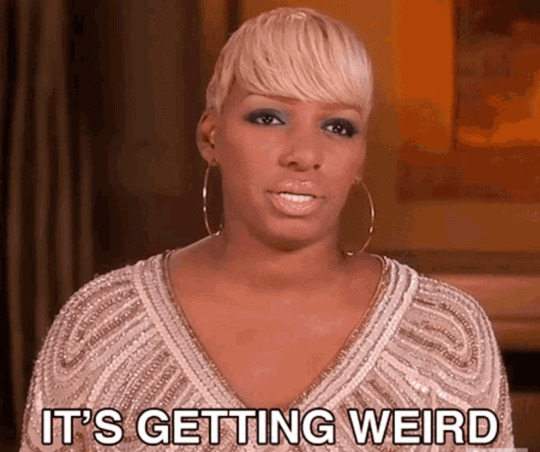
For real though, you know what this reminds me of? Jonathan Harker on his first day he noticed strange things occurring at the castle. Here’s what he said then:
“I began to fear as I wrote in this book that I was getting too diffuse; but now I am glad that I went into detail from the first, for there is something so strange about this place and all in it that I cannot but feel uneasy…”
Thanks to wanting to record his trip for Mina, he had already started taking detailed notes for the trip. These notes served him well in his time at castle Dracula.
Unfortunately, the captain of the Demeter was not taking detailed logs beforehand, but it’s telling that he begins to as soon as he notices something strange! Just a neat parallel I thought I would point out.
“On 6 July we finished taking in cargo, silver sand and boxes of earth. At noon set sail. East wind, fresh. Crew, five hands ... two mates, cook, and myself (captain).”
To note here, it has been twelve days since they set sail and it has taken twelve days to reach the point of someone logging the incidents. I suppose that’s a record above Dracula’s previous time with Jonathan, which was *three* days (really, more like two).
Also, sorry to put the answer to your post in here, @mermaid-above-water, but I figured it would be best! To answer your question of how many crew hands are on the Demeter….I’ll be real with you, I was going to take the captain’s number of “5” at face value, but @dramaticpandabear summed it up best with evidence: it’s 9. I’m going to be using their post as reference for the future when I make my notes You can get this number by adding 5 (hands) + 2 (mates) + 1 (cook) + 1 (captain). I definitely understand the confusion — like I said, I was confused too! No wonder the captain says he needs to take more accurate notes…
“On 11 July at dawn entered Bosphorus. Boarded by Turkish Customs officers. Backsheesh. All correct. Under way at 4 p. m.”
Everything seems fine here! Only thing to note is that I believe when he refers to “backsheesh”, he means the practice of bribing customs officers, sooo that’s fun. /s
“On 12 July through Dardanelles. More Customs officers and flagboat of guarding squadron. Backsheesh again. Work of officers thorough, but quick. Want us off soon. At dark passed into Archipelago.”
So it looks like this time they got less of a warm welcome, with more customs officers investigating their cargo. More backsheesh, and they had to leave the port much more quickly. Notice how they’re not finding anything strange in their cargo, say a “human”….hm….
“On 13 July passed Cape Matapan. Crew dissatisfied about something. Seemed scared, but would not speak out.”
At this point, they’ve just passed Greece. That’s not very far into their journey! Yet already, something strange is afoot — the crew seem scared. But about what? If I had to guess, Dracula is starting to give them strange dreams and because sailors are usually inclined to believe in the supernatural/superstition, they probably see it as a bad omen (especially if more than one of them had a bad dream). They probably don’t want to tell the captain though, either due to him not seeming to believe in the supernatural or not wanting to worry him (or because of one of the mates, who is a skeptic).
“On 14 July was somewhat anxious about crew. Men all steady fellows, who sailed with me before. Mate could not make out what was wrong; they only told him there was something, and crossed themselves. Mate lost temper with one of them that day and struck him. Expected fierce quarrel, but all was quiet.”
Yikes, I already don’t like this mate. He comes across like a massive jerk. The rest of the crew reminds me a lot of the villagers of Transylvania — steady, but scared. Crossing themselves and refusing to speak further on the matter….very much like the innkeeper and his wife when asked about Dracula. Perhaps they’ve seen other signs of his presence at this point as well (a mist appearance, perhaps?). It’s telling that the crew remains uncharacteristically quiet, rather than starting a fight after the mate hits one of them: this tells me they’re trying not to attract attention. But from what?
“On 16 July mate reported in the morning that one of crew, Petrofsky, was missing. Could not account for it. Took larboard watch eight bells last night; was relieved by Abramoff, but did not go to bunk. Men more downcast than ever. All said they expected something of the kind, but would not say more than there was somethingaboard. Mate getting very impatient with them; feared some trouble ahead.”
The first very strange thing has happened: a crew member — Petrofsky — has gone missing. That leaves them with 4 hands now, down to eight on the ship total. This is obviously affecting the captain negatively as he did not rest even after a watch. As for the “larboard watch eight bells” phrase, larboard was an archaic word for port (the left side of a ship), so he must have been assigned to watch that side, and as for eight bells, eight bells is the common signal on board a ship that a watch has ended.
We are also given a new name of one of the crew members: Abramoff. I’m going to imagine he’s one of the four remaining hands (it seems it was common practice to not have the cook stand watch at night, so I don’t think it’s the cook), since the captain keeps referring to his mates as just “mates”, though this could be proven wrong with time.
Again, the crew is much like the Transylvanian villagers: scared, yet resigned. They know already something like this was going to happen. However, one of the mates seems to be getting more and more impatient with them…
“On 17 July, yesterday, one of the men, Olgaren, came to my cabin, and in an awestruck way confided to me that he thought there was a strange man aboard the ship. He said that in his watch he had been sheltering behind the deck-house, as there was a rain-storm, when he saw a tall, thin man, who was not like any of the crew, come up the companion-way, and go along the deck forward, and disappear. He followed cautiously, but when he got to bows found no one, and the hatchways were all closed. He was in a panic of superstitious fear, and I am afraid the panic may spread. To allay it, I shall to-day search entire ship carefully from stem to stern.”
We get the name of another crew member: Olgaren. If he is another hand (and I feel like the captain would’ve specified if he wasn’t) we now know 3/5 names of the crew hands. We also get more information on a new mysterious incident — this time they have actually spotted a strange man aboard the ship, though he turned to mist (what I think happened) before Olgaren could find him). Finally, the captain has decided to take some action to allay the crew’s fears. Good!!
“Later in the day I got together the whole crew, and told them, as they evidently thought there was some one in the ship, we would search from stem to stern. First mate angry; said it was folly, and to yield to such foolish ideas would demoralise the men; said he would engage to keep them out of trouble with a handspike. I let him take the helm, while the rest began thorough search, all keeping abreast, with lanterns: we left no corner unsearched. As there were only the big wooden boxes, there were no odd corners where a man could hide. Men much relieved when search over, and went back to work cheerfully. First mate scowled, but said nothing.”
I like the captain’s delegation with giving the first mate the helm here. No use making the man search when he was obviously going to be complaining and degrading their worries the whole time. We also get it specified that this was the first mate: I choose to believe it was the first mate who’s been complaining this whole time and the captain just wasn’t taking accurate notes about it, though I could be proven wrong.
As for the boxes having nothing to hide….oh boy. That’s funny. Not in a haha way. But it is funny. Because they truly have no idea what lies in one of those boxes, but alas, the creature who resides in there is currently mist (if I’m not mistaken) and they cannot see the truth.
Of course, they don’t find anything and go cheerfully back to work. Good for morale, not good for the long-term.
That’s it for this Demeter’s log. Can’t wait for the next one!
16 notes
·
View notes
Note
a section from the paper on the Harkers' androgyny about Jonathan's connection to the old heroine tropes
Jonathan’s selective silences are reminiscent of the Radcliffean heroine’s unwillingness to name her fear of sexual violence directly, in that both serve to obscure the unspeakable. For an author like Radcliffe, naming the fear of rape would be scandalous. Matthew Lewis named them, and more: in his works, “the paranoid fears of a Radcliffe heroine are made the real exploits of diabolical protagonists” (M. Ellis 84). In truth, the contents of The Monk were not altogether dissimilar from other “under-the-counter publication[s] for gentlemen’s interest only” (M. Ellis 115), but that it was published as a Gothic work earned it at least an assumed female readership (M. Ellis 94). The form brought it to the attention of young women, and because young women might read it, the novel was deemed obscene. He faced public backlash (M. Ellis 114). Ann Radcliffe, whose books were wildly popular with young women, would have had to be very careful in what she addressed. Her novels could speak to fears of sexual violence, incest, patriarchal oppression, the sins of the father and more, but only obliquely. [...] By placing Jonathan in a situation generally reserved for an imperiled heroine, Stoker appears to be doing the same. A situation is set up wherein the threat of sexual violence is encoded without needing to be named. Jonathan is young, vulnerable, and comparatively naïve, and an older man of higher social status takes him as his prisoner. They are alone in a remote location. A reader familiar with Gothic tropes will see that Jonathan’s situation is like that of a Radcliffean heroine and may infer from there that Dracula, or someone else in the castle, may be a sexual threat to the young solicitor. [...]Of all the first-person narrators, only Jonathan, not Mina or Lucy, can be said to make use of the hysterical voice. His journal contains significant gaps, for one: between his resolution to cautiously learn more about Dracula and the next entry, where he first sees the Count climbing the exterior of the castle, seven days pass without any comment (Stoker 35). On the 31st of May, he finds his travel papers have been stolen; he does not write again until 17th of June (Stoker 46). These breaks in the narrative are never acknowledged, and no note is ever made of how this time was spent. Where he does write, as previously exemplified in the section on the threat of sexual violence, information and details are sometimes omitted without explanation. His fractured, evasive narrative which makes use of feminine-coded language and identifications can thus be considered a hysterical narrative and, consequently, as another level of gender performance.
(those are again significantly cut to not become huge blocks. hopefully I find an accessible link soon)
🍽️
Thank you for this, I love every word
#and I may explode before New Year's if I don't get to devour the whole work in one sitting auuuuuughhhhh#jonathan harker#dracula#gender#gothic heroine
150 notes
·
View notes
Text




Day 22 of 26 with @neopetsdotcom
DRACULA (1931)
Lauren’s Review
WHAT A TREAT! The ambiance alone makes this a captivating watch, I am of course always a sucker for a gothic, crumbling, cobweb coated castle, and the ones featured here really reign supreme. Also a huge fan of the random North American animals taking up residence in what is supposed to be an Eastern European setting
Beyond the atmosphere, Mr. Lugosi brings incredible life to a man who has been dead for centuries, he perfectly captures how skin crawling it would be for a human shaped creature who has not been human for a very long time to suddenly start having to play the part, to try to remember what it was like to be a man and perform a strange echo of that memory. The film’s lack of soundtrack too, really packs a punch at its most haunting moments, a young girl selling flowers drained dry in an instant, Mina Harker spirited silently into the night to be transformed into a monster. It is just so evocative and Romantic, it’s a movie worthy of its nearly century long adoration
My only complaint is like. It’s weird how the movie just kind of Ends? Dracula is killed quickly off screen. Lucy is never addressed? Very bizarre that the movie, which moves at a deliciously dreamlike syrupy pace, would phone in the last like, ten minutes to get to the ending. Oh well! I enjoyed the rest of it too much to be That bothered. More the journey than the destination I guess
Awl’s Review
One of the most iconic Dracula adaptations, look at Bela Lugosi in all his glory! I kept thinking about how he was dressed in THE Dracula outfit, but every other character was costumed so beating they outshone him. I love Jonathan’s short pants giving way to tight clad legs. I love every dress Mina wears. This is a good looking film, between the clothes and the sets and the cinematography.
I especially like the way Dracula is compelled to act. Each person under a vampiric influence becomes a war of compulsions and sense. Dracula can’t help but keep coming back and trying to exert supernatural influence over people, even when he might be better served just attacking. Renfield shifts between the desires for blood and service that Dracula has given him, and a more sensible concern for people. To see someone who excites the vampire, they become both desirable and prey. Do I want you or do I want to eat you?
It’s just very theatrical! It feels a bit like a play, in its structure, how it uses characters, and violence largely happening between scenes. And there is no musical score, so we are just all in the quiet theatre with them. What a treat of a film.
8 notes
·
View notes
Text
I'll be quiet, Doctor. Tell them to take off the strait-waistcoat. I have had a terrible dream, and it has left me so weak that I cannot move. What's wrong with my face? it feels all swollen, and it smarts dreadfully.
God, these are the first words that came out of Renfield's mouth after being brutally attacked by the Count to the point of unconsciousness, then seeing Seward first after being woken up. It speaks on so many unsaid things, and actions that came before the Count, before the Harkers, even before Jonathan set a single foot in Transylvania. How much has this old man suffered at the hands of the people supposed to care for him, who use his money then discards him without thoughts on his personhood, and the man who treated him like some kind of experiment until the very end.
I can't see any kind of righteous fury, nor even pity coming from Seward or Van when they began the surgery that would let Renfield talk one last time. Only Quincey, the man who has seen everything, calls for an explanation after seeing the mangled state of the poor old man, who sacrificed his life for the sole young woman (so young that she could be his daughter) who spoke to him like a human being in who knows how many years.
Renfield is a tragic character until the very end. The representation of the vulnerable, of the mentally disabled who receive no mercy from an uncaring system set up to fail them. Even the narrative itself cares less from his state, and his suffering once the groups gets all of the information they needed from him, leaving Renfield alone while agonizing; in the dark of what happened to Mina's salvation.
Utterly manipulated by the Count, dangling his freedom in front of him while feeding lies on eternal life. Never revealing anything, and being treated like a fool without a second moment to breathe. Is Renfield destined to always end up inside those four walls, will he ever be truly free, or seen like a person?
Go long old man, go long, right over the edge of the earth, and jump to a place where there is no pain nor suffering at the hands of your fellow human beings. Maybe Renfield will find a girl in a white nightgown, waiting for someone on the other side, and they will chat about frivolous things in a way that neither could when they were alive.
#He was murdered just like he lived: alone and imprisoned#Poor old man#dracula daily#dracula#renfield#r.m. renfield#cw ableism
90 notes
·
View notes
Note
⭐ Step into the Light, which deserves way more attention
Thanks so much for the ask! This is one of my fics I'm most proud of. :)
The fic in question: "Some scenes from Quincey Morris's and Jonathan Harker's complicated relationship, from their time in Varna to the end of the novel, told through their alternating points of view."
Spoilers ahead…
-I know that, like most of my fics, this one was inspired by a Tumblr discussion, but I can't remember who started it or exactly what it was about, other than something about being able to surmise a very interesting relationship between Quincey and Jonathan near the end of the book, culminating with Quincey dying in Jonathan's arms. There was just a lot to explore there, and the idea of doing a back-and-forth perspective switch came to mind.
-Figuring out which beats of the story would be from which perspective was a little tricky; this was one of the few fics where I created a rough outline, and some of the perspectives got shuffled one to the other in order to keep them alternating.
-I usually write in third person, but the idea of using first/second person, with Quincey and Jonathan referring to each other as "you" in their respective scenes, got stuck in my head. It gave the story such an interesting intimacy to it, showing how these events are causing their worlds to sort of revolve around each other. To lend a greater sense of immediacy, I made it present tense instead of my usual past tense.
-Writing Jonathan's scenes came fairly naturally, since I've written a lot from his perspective (albeit in third person) and my third-person voice for him isn't that different from his first-person speaking voice.
-Quincey's scenes were much more of a challenge; I ended up drafting them in my "normal" narrative voice and then went back later to rewrite nearly every sentence, taking into consideration his speaking patterns. Although I don't know anyone from Texas very well, I drew a lot from my extended family who live in the South, trying to capture the vivid phrasing and storytelling sensibility that goes into a lot of their speech.
-I always have a hard time coming up with titles (which is why half my fics are named things like "Two Men Talking" LOL). But I was pleased with the title from this one, alluding to the lines: "I feel you staring at us like a coyote outside the light of a campfire ring…I wish I could grab your hand the way you grabbed mine just days ago. Draw you into this ring of light, hold your hand till you know you're safe."
-I decided that I wasn't going to explicitly say whose perspective we were in during any given scene, relying on the line breaks and the different in dialect to get it across. I think I succeeded.
-My preferred headcanon of Jonathan during this time is actually a lot less bitter and standoffish, but it was interesting to explore this version of him in this fic. He's running on pure animal instinct at this point, and Quincey is (wisely) treating him as such.
-I got a bit obsessed with the dynamic of Quincey being fully aware that Jonathan would kill him if he ever tried to stake vampire Mina— and him being cool with that. They've each made their promises, and it's Quincey's job to make sure that this clash never has to happen (but to accept the consequences if it does).
-I had to throw in a lil Quincey pining over Jonathan (and vice versa) because I am a big sucker for Yeehawrker. :D
-I am still very happy with the lines, "You'd look good spattered in the blood of a fresh kill. You'd still look good, even if the blood was mine." (Foreshadowing babey)
-Had to let Jonathan have a good cry! I thought this was an important moment, too, because Jonathan being able to not only break down in front of Quincey, but accept his comfort, was a big turning point for the two of them. Live in the moment, Jonno. You got this.
-Originally Quincey's death scene was from Jonathan's perspective, which makes more sense than writing from a guy who's dead, but I actually really like that my back-and-forth formula ended with Quincey's view of his own death; I think it gives the scene an eerie, almost dreamlike feel, and nicely bookends the whole fic through Quincey's eyes. (Present tense to the rescue, too.)
-I decided to draw out Quincey's monologue a bit more, and give Jonathan a couple words, as well as tying back in the imagery of Jonathan covered in Quincey's blood. And of course, we gotta have the final image of Jonathan (metaphorically stepping) into the light, smiling in the light of the sunset. It was a nice image to end with.
I'm enjoying these Director's Commentaries a bit too much! ;) Thanks again for asking!
(Ask game here)
#ask games#answered#dracula daily#dracula daily spoilers#quincey morris#jonathan harker#my writing#dracula (novel)#director's cut game
17 notes
·
View notes